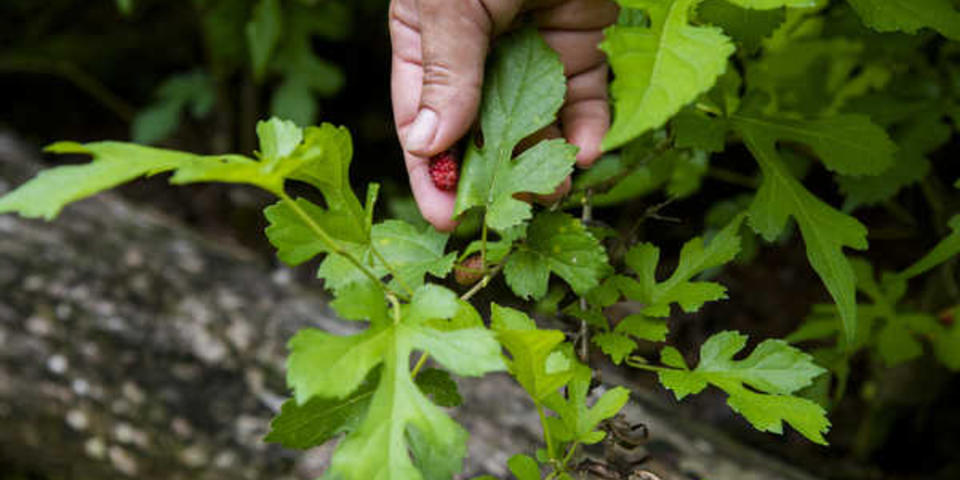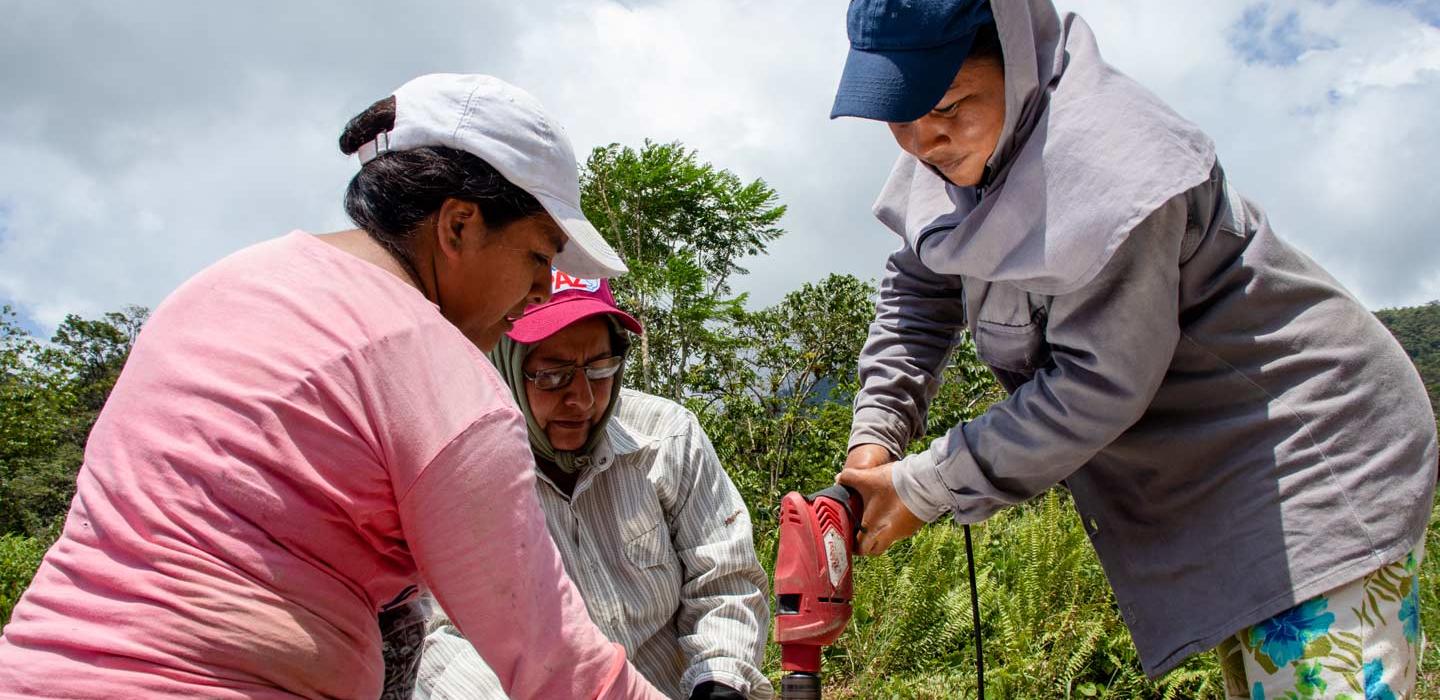
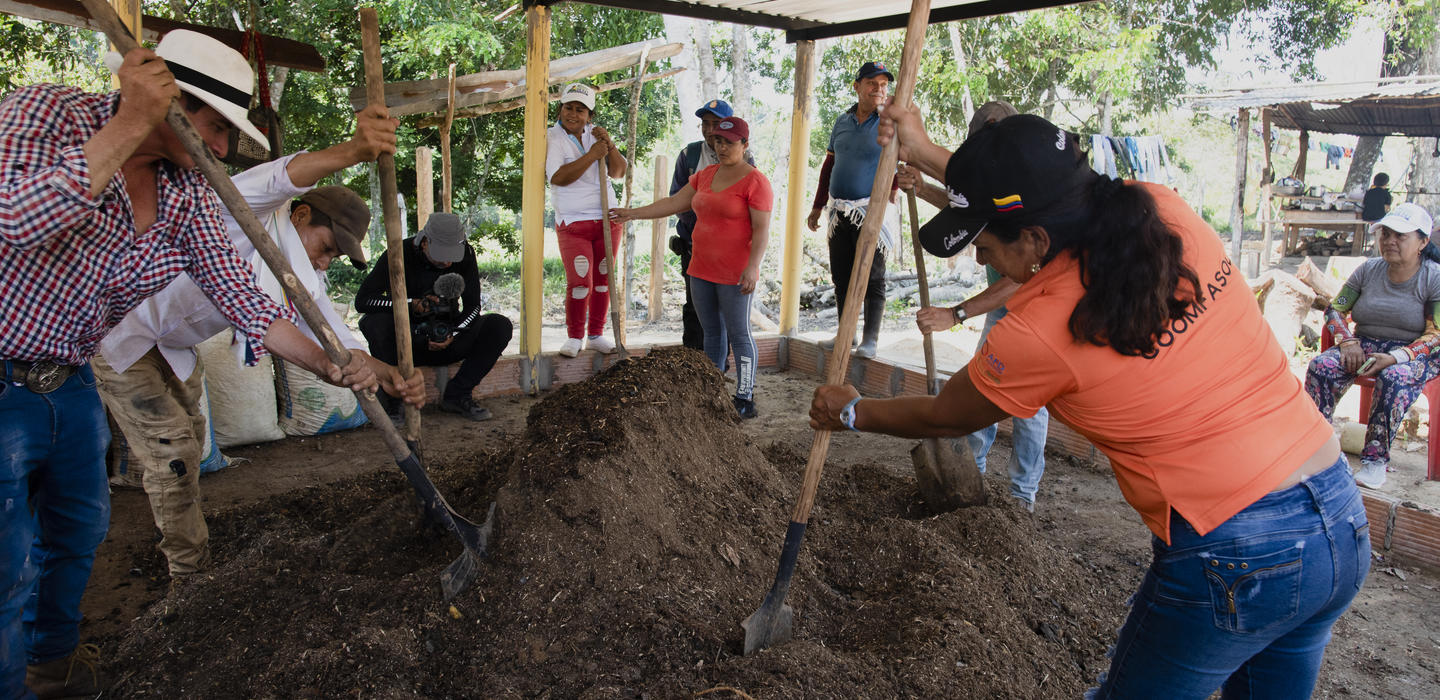
We continue with the Tracking our impact: series to share the lessons learned in our past five years of work. In the last issue we analyzed how the collaborative and learning-by-doing approaches, which characterize Rural Alternative Schools (ERAs, for its acronym in Spanish), have been crucial to build trust between campesino (rural peasant) communities, excombatants, and public and private institutions in some of the territories most affected by decades of armed conflict in Colombia. This current issue focuses on how collaboration and trust have laid the groundwork for the burgeoning of feasible productive and commercial projects that contribute to promoting the sustainable development of rural territories.
After working in 27 Colombian municipalities with 4,902 people, including campesinos, peace signatories, Venezuelan migrants and families who abandoned coca cultivation, we have learned that the main asset of the Colombian countryside is its people. Working alongside communities as partners to strengthen their organizations and working capacity has enabled them to identify their own resources and find opportunities to coordinate through collaborative networks that attract new partners and promote a joint contribution to the development of their territories. The projects we support have leveraged US $5,659,066 with an investment of US $1,012,008, creating 2,802 jobs, reaching commercial agreements for US $11.5 million and achieving US $888,000 in income and savings for community organizations in the last three years. However, the greatest success of this approach has been its ability to foster sustainable productive and collaborative business practices that create social value beyond monetary. This explains why 98% of the excombatants participating in ERAs and 96% of campesinos consider that the collaborative projects in which they are involved have been important or very important for their regions. 70% of the excombatants say that their main motivation to remain in the peace process is to contribute to bringing social change to their regions.
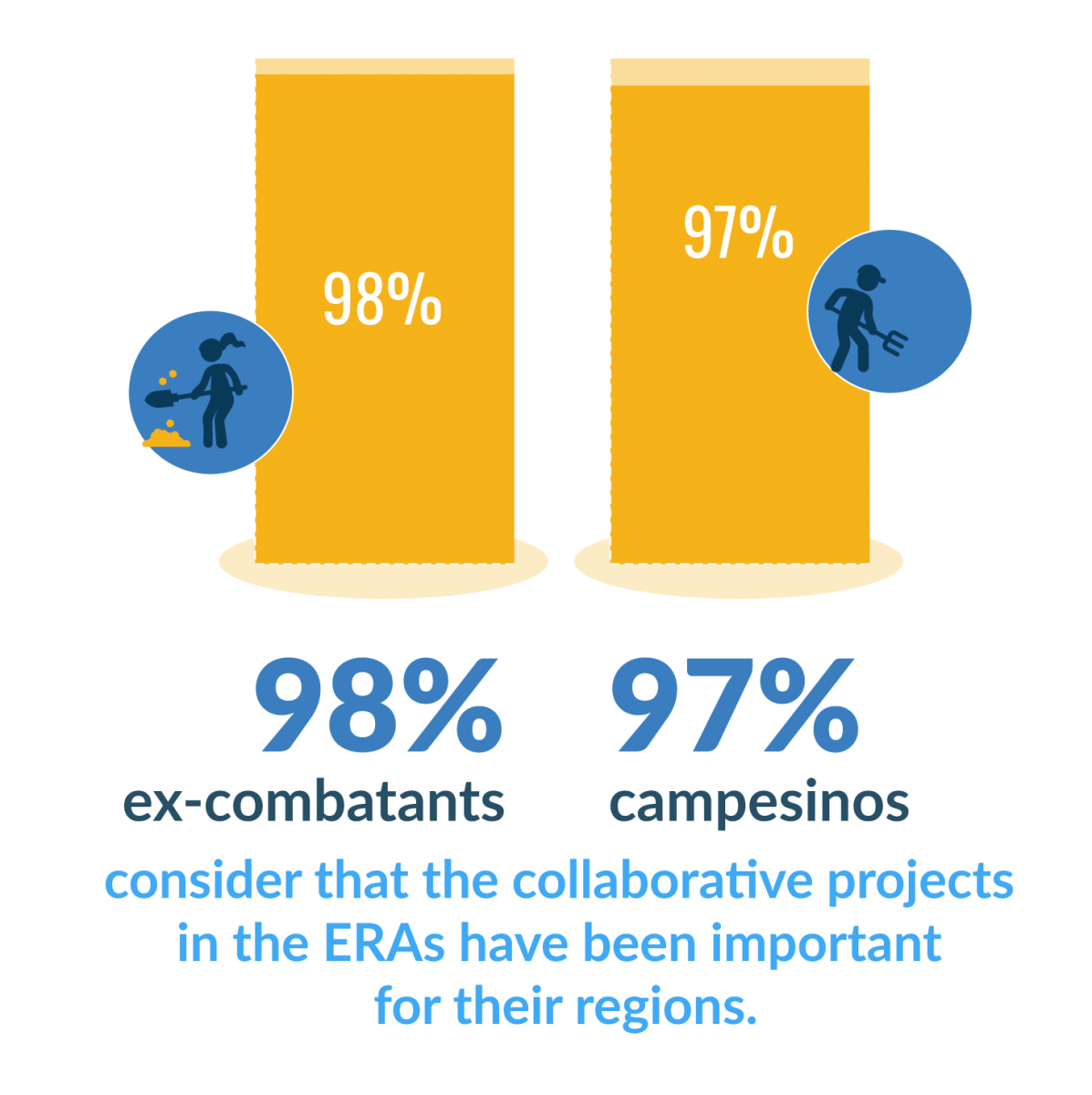
Besides the income generated by these productive projects, this work improves the livelihoods of participants, and boosts regional economies in a sustainable manner. Community or home orchards improve food access and security; the improvement of production practices and the use of by-products helps preserve the environment while reducing costs; and the productive, commercial and organizational fabric promotes better conditions for the social well-being of campesino communities.
A Local and Community Approach that Enhances Networking Results:
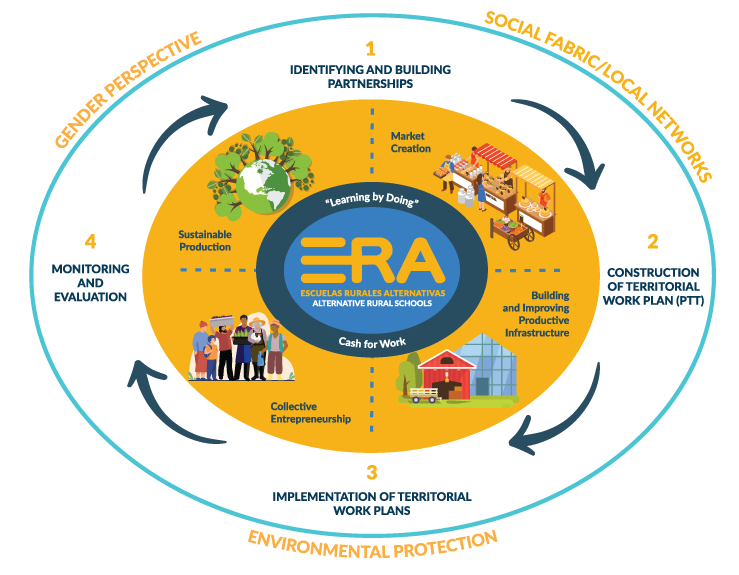
In our experience, prioritizing strategic interventions with each community and strengthening collective ventures that catalyze rural development has been an effective way to optimize the investment of limited public and international donor funds. By working with the resources at hand, we rely on the power of partnerships and have witnessed the emergence of an efficient networking structure that creates economies of scale and reduces risk by attracting private investment.
A flagship example of how interventions aimed at driving collaborative processes can boost regional economies is the ERA in Tuluá, in which the campesino association ASOPROVENUS and the excombatant cooperative COOMULNES participate. In the village of Venus and in partnership with the Governor’s Office of Valle del Cauca, the Mayor’s Office of Tuluá, the UN Verification Mission in Colombia and UNDP, we supported the construction of a collection center, the installation of a Guardiola coffee drier that improved the quality of dried coffee, as well as the implementation of a quality and cupping center for coffee bean assessment. This allowed Venus to become a commercialization alternative for other nearby villages in the rural zone of Tuluá, reducing transportation costs by up to 90% for local producers, who can sell their coffee at a higher price thanks to the Collaborative Commercial Partnership with the multinational Illy Café. Additionally, by completing the coffee production chain, the cooperative created the brand Café Venus, that is now sold locally.
The regional impact of this initiative was expanded in 2020 with the creation of the ERA in the neighboring municipality of Sevilla, which brought together excombatants and campesinos in agricultural projects. The strengthening of the COOMULNES cooperative encouraged excombatants of Sevilla to join it, thus expanding its agricultural production and marketing capacity. In the ERA of Sevilla, 100% of the participants belong to a cooperative, while in the ERA of Tuluá the affiliation of excombatants to a cooperative increased from 93% in 2018 to 100% in 2020.
Because of this impact, we believe it is important to strengthen local associative capacity through cooperatives, corporations and associations, because it promotes collective economic dynamics. This fosters the role of organizations as an instrument of social welfare through income generation, the integration of new support and marketing networks, and the strengthening of the underlying social fabric. PASO provides support for the legal, administrative and social strengthening of these organizations.
The nationwide ERA perception and satisfaction survey results show that 83% of the participants in the reincorporation process belong to a cooperative and 98% of them consider the work carried by their cooperatives in the economic reincorporation process to be important or very important. Between 2019 and 2020 the participation of community members in cooperatives increased from 38% to 67%. The survey also shows that cooperative members have acquired a high degree of knowledge on economic management, goal fulfillment and compliance of cooperatives’ activities (63%, 71% and 60%, respectively).
Rural Labor Qualification
All projects have incorporated a cross-cutting training component, since it allows the project to connect local and traditional knowledge with scientific and technical expertise, making rural economies more prosperous and allowing them to connect to other economic environments, like international markets. PASO Colombia mobilizes five areas of knowledge which, together, strengthen campesino economies:
- Knowing how to produce
- Knowing how to organize
- Knowing how to commercialize
- Knowing how to finance
- Knowing how to preserve
In their daily work with participants, ERAs operate as living classrooms. Instead of a predefined curriculum, knowledge revolves around a permanent technical accompaniment of the productive projects developed in each territory that deepens the knowledge required for the sustainability of each specific project. This technical accompaniment is aimed at promoting optimal farm management, use of waste and by-products, manufacturing and use of fertilizers and animal feed with local raw materials, use of semi-confinement systems to complement feeding for some animals, incorporation of new technologies and environmentally sustainable practices, implementation of raw material transformation processes, and creation of home or community orchards for food security, among other activities. This accompaniment also includes the creation and qualification of marketing networks.
With this educational approach developed through the learning-by-doing methodology, 77% of the participants rate the technical assistance received in ERAs as good or excellent. This same approach was used in the Contingency Plan to Support Ex-Coca Grower Families, funded by the UN Multipartner Trust Fund for Sustaining Peace in Colombia and designed and implemented by PASO Colombia in coordination with the Presidential Office for Stabilization and Consolidation. 86% of the project participants stated that they will continue to implement the practices learned for soil improvement and organic fertilizer production; 91% will continue to use the methods learned for the use of organic waste; and 56% will produce animal feed from plant material and other products available in their farms thanks to what they learned in the project.
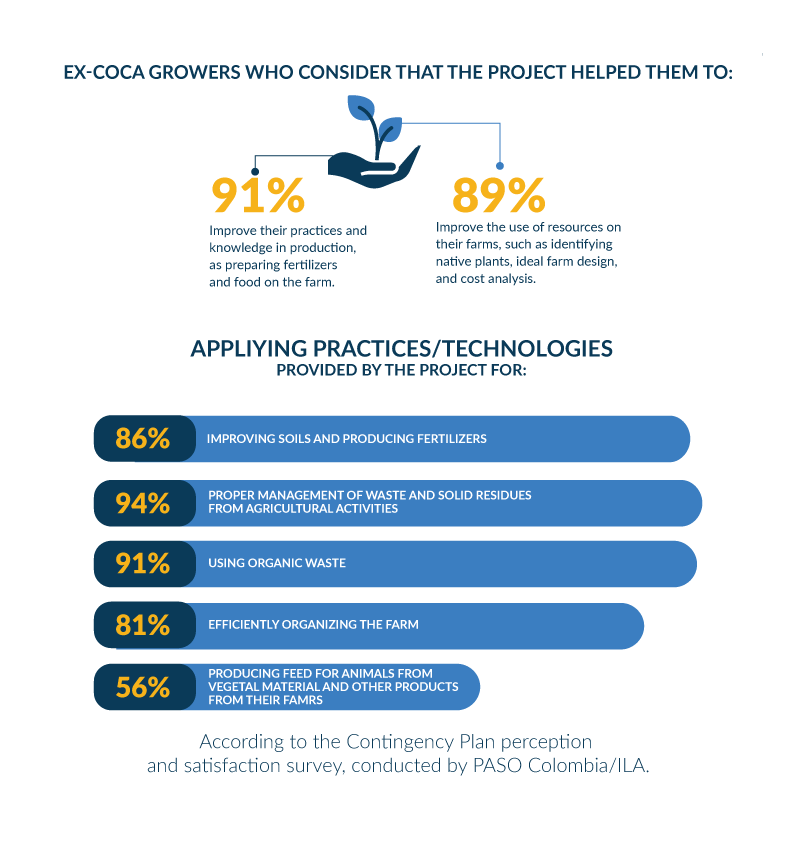
Increased Productivity and Cost Reduction:
The networking approach with communities as main partners, which focuses on qualifying their work and collaboration capacity, improving their productive practices, strengthening collective infrastructure, and creating value chains and new markets, has proven effective in improving productivity and reducing the costs of these rural enterprises in a socially and environmentally sustainable way.
A good example of this approach is the ERA of Fonseca, in the department of La Guajira. In this ERA, the adoption of more efficient practices for egg production, the selection of the Isa Brown species, which is more suitable for the area’s conditions, and the combination of a grazing system with the use of local by-products to supplement the hens’ feed, allowed a scaling up of production, reduced costs and increased sales at much higher prices for the neighboring communities. Even during the crisis caused by the COVID-19 pandemic, when the local price of eggs rose from COP $10,000 to $20,000 a dozen, the ERA of Fonseca maintained its production and kept a price of $9,000 for local sales. This, in turn strengthened solidarity bonds with the communities that embraced this group of peace signatories in their territory. The project also promoted the creation of an agricultural store to sell products from excombatant cooperatives participating in the ERA of Fonseca. This especially benefited the neighboring community of Conejo by reducing transportation costs and offering fair prices to buyers. This strengthening work also motivated other local institutions to join the commercial initiative.
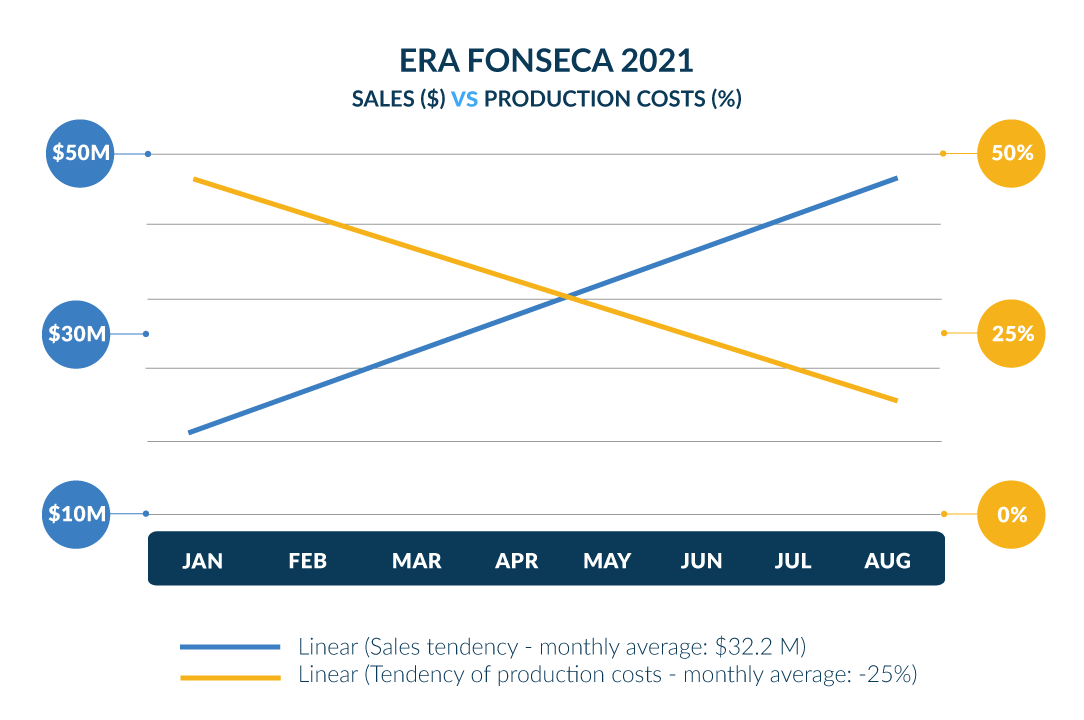
Another important example is the ERA of San José del Guaviare, where we supported a fish farming project through the installation of machinery and training for the production of organic concentrates using local raw materials. Many of them used agricultural by-products that could be purchased from neighboring farms, thus strengthening local collaboration. This concentrate biofactory reduced the cost of fish feed by 40%, making the project profitable and sustainable in the medium and long term. This production unit created 15 formal permanent jobs and 200 indirect positions for raw material suppliers. As a whole, the project created a marketing line of concentrates in the region, and a Collaborative Commercial Agreement was reached with the campesino families of the village Colinas (Guaviare), which allowed them to purchase animal feed at below-market prices.
Besides increasing productivity and reducing the cost of commercial products, participants in PASO Colombia’s projects have seen significant savings in food harvested for self-consumption and organic waste reused as raw material for other projects, among others. As a result, their savings capacity is now higher than the national average for the rural population.
In the case of ERAs, the savings rate for ex-combatants has increased (31% of them were able to save in 2020 compared to 29% in 2019 and 23% in 2018). Such an increase occurred even during the COVID-19 pandemic. For campesinos participating in ERAs, the savings capacity rate increased from 5% in 2018 to 20% in 2020. Moreover, as a result of the implementation of the Contingency Plan, 43 percent of the participants stated that they managed to save money. These figures contrast with the results obtained in the Pulso 2021 Survey, conducted by the National Administrative Department of Statistics (DANE, for its acronym in Spanish), which shows that only 11.5% of people have the capacity to save in Colombia.
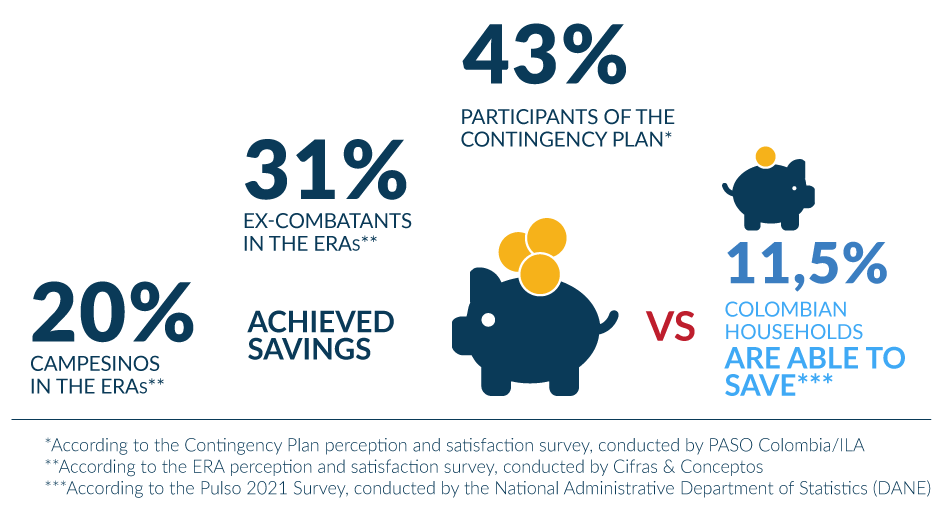
Our experience has confirmed that the interrelation between the economic and social axes offers the participating partners integral results for their productive projects and their quality of life. We are very pleased to confirm that at the national level, 89 percent of the excombatants who participate in ERAs stated that they had plans to continue working collaboratively with the communities. Likewise, 70% of the community members plan to continue working in associative projects with excombatants, demonstrating that collaborative work has proven to be an effective means for them to improve their quality of life. A strengthened social fabric is able to engage in more dynamic legal economies, which in turn makes it possible for rural territories historically affected by the armed conflict to have better expectations regarding their future and prosperity.
1 Retrieved from: https://www.dane.gov.co/index.php/estadisticas-por-tema/encuesta-pulso-social
